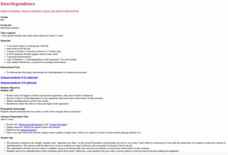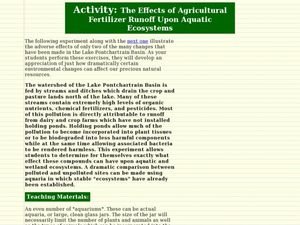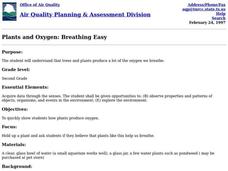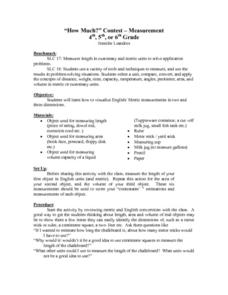Curated OER
WET Science Lesson #3: Comparison of Aquatic and Terrestrial Plants
Elementary life science explorers compare and contrast aquatic and terrestrial plants (elodea and soybeans) in a Venn diagram. Some background information is provided to support direct instruction, and general instructions are provided...
Curated OER
Interdependence: Discovering What Makes a Balanced Ecosystem
Students demonstrate that plants and animals are interdependent in a balanced ecosystem.
Curated OER
Weather
Students read a weather map. Using the local newspaper, Columbus Dispatch, small groups investigate that air has pressure and that temperature and pressure are inversely related in weather. They display their findings on a graph or...
Curated OER
Earth's Hydrologic Cycle
Students examine the water cycle. For this hydrologic cycle lesson, students follow the provided procedures to demonstrate the how water moves around the planet through the dynamics of the water cycle.
Curated OER
Have You Ever Seen a Sea Monkey?
Fourth graders observe brine shrimp over several days. They create drawings showing the growth and development of the shrimp. They research web sites to find out where brine shrimp fit on the food chain and what makes the shrimp unique.
Curated OER
A Fish in Water
Water is essential to all living things. This classroom experiment lets everyone observe goldfish and discuss what fish need to live, like food & clean water. They then listen to the book, Fish Out of Water, and compare the fictional...
Curated OER
Observing Brine Shrimp
Students observe brine shrimp eggs, create an appropriate environment for their survival, and observe their growth.
Curated OER
Science: Identifying Fish Parts
Young scholars identify parts of fish and their functions. They compare the fish's body parts and purposes to their own. Working in groups, they complete worksheets by labeling fish parts on a drawing.
Alabama Learning Exchange
Where is the Dirt? A Lesson in Hydroponics
Students use the Internet to research hydroponic gardening which is the growing of plants without soil. They participate in an experiment where a hydroponic garden is contructed in the classroom for observaion. They recorde information...
Curated OER
Where Do We Get Clean Water?
Students investigate the concept of a filter. They use simple supplies in order to construct one after watching a demonstration performed by the teacher. An important warning that the project water is not clean for drinking is included....
Curated OER
Animal Behavior: "Groggy Goldfish"
Students observe goldfish in different environments. In this biology lesson plan, students watch the behavior of goldfish in water of varying temperatures.
Curated OER
Marine Life: Anatomy of a Humpback
Third graders prepare for a trip to view marine life. In this science lesson plan, 3rd graders assemble a picture of a Humpback whale on a grid.
Curated OER
Air and Air Pressure
Students explore air and air pressure. In this science lesson plan, students find air and discover that it takes up space, has weight, and exerts pressure as they complete an activity.
Curated OER
The Effects of Agricultural Fertilizer Runoff Upon Aquatic Ecosystems
Students measure the toxic levels of runoff and discuss the effects it would have on the aquatic system. For this runoff lesson plan, students answer questions to how runoff would affect the animals in an aquatic system.
Curated OER
Amphibians and Reptiles
In this amphibians and reptiles worksheet, students answer short answer questions about amphibians, reptiles, their characteristics, groups, and more. Students complete 8 questions total.
Curated OER
SHARK BODY PARTS
Students list all the parts on the shark and label a diagram of the shark anatomy. They define the words, "gill and fin" and describe what they are used for.
Curated OER
Bay B C's
In this unit of lessons, young scholars examine the Chesapeake Bay area. Students learn what lives here and how humans are affecting the area.
Curated OER
CREATE A CAVE
Students investigate the concept of caves by conducting an experiment. The lesson contains background information for the teacher. They collect data while making observations and write a review of the concept once the experiment is...
Curated OER
Pollution
Third graders investigate pollution. They discuss pollution and its effects. They create a Venn diagram of pollution and people polluting. They create a landfill and predict what will occur over a week's time. They create two air...
Curated OER
"How Much?" Contest - Measurement
Young scholars work with measurements of length, area, and volume capacity of a liquid. They watch a teacher demonstration of both English and metric units before they estimate and take actual measurements of assigned items a three...
Curated OER
Water Properties of the Great Salt Lake
Fourth graders examine the ecosystem of the Great Salt Lake in this two-part lesson, completing a KWL chart before and after the field trip to the site. While there, they draw and write about their observations. To test for buoyancy,...
Curated OER
Water Filtering
Students investigate how polluted water is filtered so people can use this recycled resource. They conduct an experiment in which they put "polluted" water through a filtering system. They investigate what happens at a water treatment...
Curated OER
Making A Terrarium
Students make a terrarium from common household items that are brought to class. They can be creative with materials but the method is set for how the mini-lab is set up. Students read a book about an ecosystem to stimulate the topic for...
Other popular searches
- Aquarium Maintainance
- Aquarium Diorama
- Aquarium Field Trip
- Monterey Bay Aquarium
- Aquarium Maintenance
- Special Needs Aquarium
- Marine Aquariums
- Aquarium Trip
- Aquarium Ecosystem
- Salt Water Aquariums
- Fish Aquariums
- Aquariums Field Trip

























